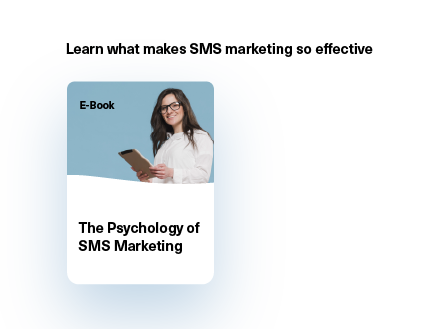SMS is widely used in the insurance industry due to it being a cost-effective and reliable channel. It’s much more than a marketing tool; SMS is also used to streamline business communication and enhance customer service. This article offers a quick guide to using SMS for insurance firms and includes use examples, best practices to follow, and tips on getting started.
When it comes to communicating with potential policyholders, insurance text message marketing is an essential tool for insurance agents to leverage. Insurance agencies need access to a range of marketing channels to reach prospective customers and sell their insurance products. To reach potential customers quickly, your insurance agents can use SMS marketing to send SMS messages in bulk.
The benefit of SMS for insurance companies
Compared to other marketing and communication channels, SMS often provides greater value and more impact. This is because SMS has incredibly high open rates (around 98%), and that text messages are naturally concise, making them instantly digestible.
Email has an open rate of 21.36% in the insurance industry. Emails can easily get lost in a cluttered inbox or forgotten about entirely. Think about it: how many times have you seen an email arrive and made a mental note to read it later when you have time, only for that good intention to slip your mind?
SMS helps insurance companies to find new customers, improve customer service and ultimately, increase sales. SMS is particularly beneficial when integrated with a CRM tool as you can provide tailored and targeted text messages – and even automate them.
Say, for example, that through your CRM system, you identify a group of customers who have car insurance due for renewal. By setting up an automated renewal reminder text, you can get in touch with those customers at precisely the right time when they’re thinking about their options for the following year. You can include a website link to the customer’s policy documentation online so they have all the information they need when making a decision.
SMS is also helpful for administering customer service and for sending out customer questionnaires. It’s also the ideal channel to assist customers with unique PIN codes for secure account login.
SMS insurance case studies and examples
SMS offers insurance customers a convenient and quick way to receive information. Real-life insurance providers are using SMS for:
1. Claim status updates
Insurance providers now recognise that if customers need to file a claim, they want to do so quickly and effortlessly from their mobile devices. As such, many providers offer the option to start a claim from a mobile app and then get updates on the claim’s status by text message. Amica is one example that allows customers to enrol for SMS notifications.
Example:
Hi [Name], your claim is currently being reviewed. If accepted, we aim to pay funds (minus your excess) into your account within 10 working days.
2. Strengthening customer relationships
Aviva Canada is another provider that uses SMS for customer communications, to reduce friction between consumers and property and casualty insurance brokers. Adoption of text messages is much higher than that of their mobile app, according to Aviva Canada’s chief claims officer.
3. Communicating policy details
SMS is sometimes used to communicate policy details to new customers, so they have the essential information to hand if ever they need to make a claim. Annualtravelinsurance.com offers this option (in exchange for a small fee from the customer).
Example:
Thanks for taking out travel insurance with us, [Name]. Your policy reference is [Number]. Call [Number] if you need to claim. Safe travels!
4. Turning leads into customers
As mentioned earlier, SMS is ideal for marketing purposes. Many providers now offer text messaging among marketing preferences, alongside email, phone and post. Read how one insurance agent texts potential customers a picture of their quote during follow-ups to make the text feel more official and to encourage callbacks.
SMS best practices for insurance providers
To engage existing customers, each insurance agent must follow a range of best practices to make sure their SMS messages unlock the full potential of this marketing channel.
There are several best practices insurance companies need to know about and follow to ensure that text messages are sent lawfully and in a way that won’t annoy customers.
1. Get legitimate opt-ins
Many countries have rules and regulations in place that require you to get explicit permission to send text messages. Examples are the GDPR, which covers Europe, and the TCPA, which covers the United States and Canada.
Text messaging laws are there to protect consumers from spam texts. It’s right that you should only send an SMS to customers or leads that genuinely want to hear from your business. To get explicit permission for sending SMS, you should provide ways for subscribers to opt-in. This could be through an online landing page, as part of a payment portal or simply by getting customers to text a dedicated shortcode or long code number.
As well as providing a choice for opt-ins, you should also offer subscribers a chance to opt-out from SMS communications. The best practice in this regard is to include an opt-out link in each text message you send.
2. Personalise your texts
Customers or leads are more likely to interact with your texts if you include their names in your messages. Also, include your company name (if you don’t use Verified SMS) to ensure the recipient knows where the text is coming from.
You can use SMS content to foster customer retention and increase customer satisfaction. When customers are kept in the loop and have a good relationship with your insurance business, this can inspire retention. Building relationships with your current customers is vital to the overall sustainability of your business.
3. Send relevant texts only
If you’re going to send marketing texts, be sure they’re relevant. Don’t send a sales text to someone who has already taken out an insurance policy. Dig deep into your customer insights to learn what type of communications your customers will appreciate.
4. Automate your texts
Automating your text campaigns will streamline agent workflows and free up their time to focus on more complex tasks and enquiries. Account security PIN codes, renewal reminders and ‘claim received’ notifications are examples of the types of texts that can be automated.
When you have mass texting marketing campaigns running on autopilot, insurance agents can focus on meeting the needs of customers while engaging others through SMS messages. Depending on the SMS platform, an insurance company should have the ability to fully customize marketing messages to personalize the communication.
How to start sending SMS messages
Before you can start sending SMS for your insurance company, you’ll need to gather a list of contacts (customers/leads etc.) who have opted in to receive your text messages. Then, you’ll need to select an SMS provider that offers application-to-person (A2P) messaging.
Essentially, an SMS provider enables you to send text messages in bulk (a must for SMS marketing). A good SMS API will integrate with your CRM system, offer SMS campaign tools and have complete analytics built-in, so you can see how your campaigns are performing. Messente offers all this and more – it’s built to scale and will handle any volume of messages as your business grows.
Once you’ve chosen your preferred SMS provider, it’s simply a matter of uploading your contacts to the provider’s application and creating your first text and sending it. With Messente, you can do this via our online dashboard or use our Quickstart guide to help you integrate our app into your own system quickly and easily.
When you have the right text message marketing platform for your insurance business, it becomes remarkably easy to engage with existing and potential customers. If your insurance agents want to explore new ways to communicate with existing clients and set appointment reminders. This is the way to go. The agents can automatically send customized updates at the click of a button.
Is your insurance company ready to use SMS?
If you need to send out PIN codes, policy renewal reminders, key policy details, or use two-way messaging for customer service, SMS is an excellent option. Text messages are direct, reliable and affordable, hence why this channel is already popular in the insurance sector.
Get started today with Messente. Sign up for a free account and send your first text message is on us (no credit card details required).










